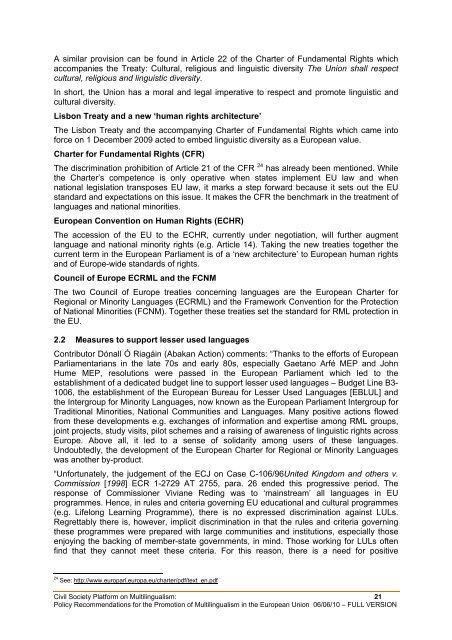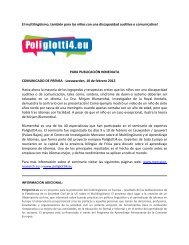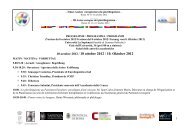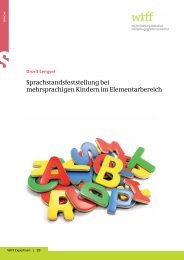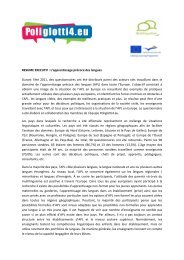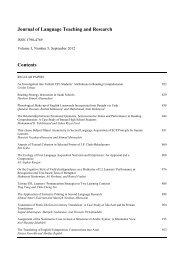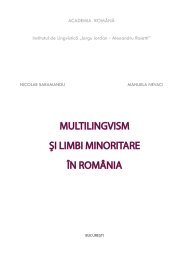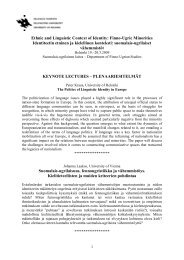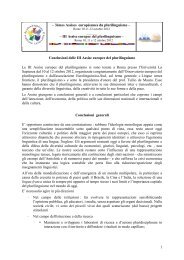FULL VERSION - European Commission - Europa
FULL VERSION - European Commission - Europa
FULL VERSION - European Commission - Europa
Create successful ePaper yourself
Turn your PDF publications into a flip-book with our unique Google optimized e-Paper software.
A similar provision can be found in Article 22 of the Charter of Fundamental Rights whichaccompanies the Treaty: Cultural, religious and linguistic diversity The Union shall respectcultural, religious and linguistic diversity.In short, the Union has a moral and legal imperative to respect and promote linguistic andcultural diversity.Lisbon Treaty and a new ‘human rights architecture’The Lisbon Treaty and the accompanying Charter of Fundamental Rights which came intoforce on 1 December 2009 acted to embed linguistic diversity as a <strong>European</strong> value.Charter for Fundamental Rights (CFR)The discrimination prohibition of Article 21 of the CFR 24 has already been mentioned. Whilethe Charter’s competence is only operative when states implement EU law and whennational legislation transposes EU law, it marks a step forward because it sets out the EUstandard and expectations on this issue. It makes the CFR the benchmark in the treatment oflanguages and national minorities.<strong>European</strong> Convention on Human Rights (ECHR)The accession of the EU to the ECHR, currently under negotiation, will further augmentlanguage and national minority rights (e.g. Article 14). Taking the new treaties together thecurrent term in the <strong>European</strong> Parliament is of a ‘new architecture’ to <strong>European</strong> human rightsand of Europe-wide standards of rights.Council of Europe ECRML and the FCNMThe two Council of Europe treaties concerning languages are the <strong>European</strong> Charter forRegional or Minority Languages (ECRML) and the Framework Convention for the Protectionof National Minorities (FCNM). Together these treaties set the standard for RML protection inthe EU.2.2 Measures to support lesser used languagesContributor Dónall Ó Riagáin (Abakan Action) comments: “Thanks to the efforts of <strong>European</strong>Parliamentarians in the late 70s and early 80s, especially Gaetano Arfé MEP and JohnHume MEP, resolutions were passed in the <strong>European</strong> Parliament which led to theestablishment of a dedicated budget line to support lesser used languages – Budget Line B3-1006, the establishment of the <strong>European</strong> Bureau for Lesser Used Languages [EBLUL] andthe Intergroup for Minority Languages, now known as the <strong>European</strong> Parliament Intergroup forTraditional Minorities, National Communities and Languages. Many positive actions flowedfrom these developments e.g. exchanges of information and expertise among RML groups,joint projects, study visits, pilot schemes and a raising of awareness of linguistic rights acrossEurope. Above all, it led to a sense of solidarity among users of these languages.Undoubtedly, the development of the <strong>European</strong> Charter for Regional or Minority Languageswas another by-product.“Unfortunately, the judgement of the ECJ on Case C-106/96United Kingdom and others v.<strong>Commission</strong> [1998] ECR 1-2729 AT 2755, para. 26 ended this progressive period. Theresponse of <strong>Commission</strong>er Viviane Reding was to ‘mainstream’ all languages in EUprogrammes. Hence, in rules and criteria governing EU educational and cultural programmes(e.g. Lifelong Learning Programme), there is no expressed discrimination against LULs.Regrettably there is, however, implicit discrimination in that the rules and criteria governingthese programmes were prepared with large communities and institutions, especially thoseenjoying the backing of member-state governments, in mind. Those working for LULs oftenfind that they cannot meet these criteria. For this reason, there is a need for positive24See: http://www.europarl.europa.eu/charter/pdf/text_en.pdfCivil Society Platform on Multilingualism: 21Policy Recommendations for the Promotion of Multilingualism in the <strong>European</strong> Union 06/06/10 – <strong>FULL</strong> <strong>VERSION</strong>


